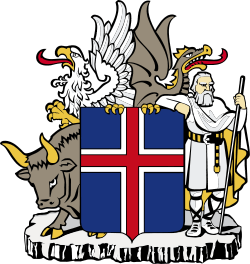Icelandic presidential elections
 |
| This article is part of a series on the politics and government of Iceland |
| Constitution |
|
Institutions |
|
Icelandic presidential elections determine who serves as president of the Republic of Iceland for four-year terms. The mandate of the current president, Ólafur Ragnar Grímsson, expired in the summer of 2016. Guðni Th. Jóhannesson won the presidential election, which was held on June 28, 2016.[1]
It is common for there only to be one candidate declared at the time of the closure of nominations, normally the incumbent president, in which case no election is held and the incumbent is declared to be re-elected. This has happened in 1956, 1960, 1964, 1972, 1976, 1984, 1992, 2000, and 2008.
Elections
- Icelandic presidential election, 1952
- Icelandic presidential election, 1968
- Icelandic presidential election, 1980
- Icelandic presidential election, 1988
- Icelandic presidential election, 1996
- There was no election in 2000
- Icelandic presidential election, 2004
- Icelandic presidential election, 2008
- Icelandic presidential election, 2012
- Icelandic presidential election, 2016
See also
References
- ↑ "Guðni Jóhannesson wins Iceland's presidential election". The Guardian. June 26, 2016. Retrieved 31 August 2016.
This article is issued from Wikipedia - version of the 9/1/2016. The text is available under the Creative Commons Attribution/Share Alike but additional terms may apply for the media files.